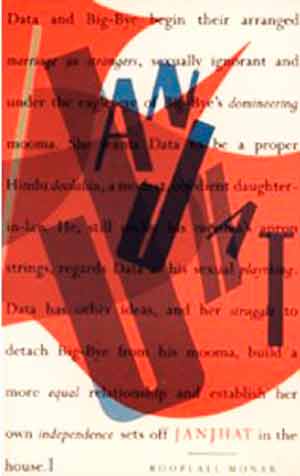Book Review
1989, pp.141. ISBN 0 94883 30 0

A review by Frank Birbalsingh
Janjhat is Rooplall Monar`s first novel and third book, appearing after Backdam People, a volume of stories, and Koker, a collection of poems, both of which were published in 1987. Monar who was born in 1947, in Lusignan, a sugar plantation in Guyana, is also the author of two other collections of stories – Estate People (1994) and Ramsingh Street (1998) - and a second novel Tormented Wives (1999), all of which seek to portray everyday living conditions of descendants of Indian indentured workers on Guyanese sugar plantations.
The conditions in Janjhat existed around the 1950s in an unnamed fictional village, no doubt based on actual Lusignan. The village itself is a new settlement of houses built by workers from a nearby sugar plantation or estate, using loans from a Sugar Industry Labour Welfare Fund designed to help workers escape from the cramped and insanitary estate quarters their forebears had inherited from the African slaves they replaced after Emancipation in the 1830s. The chief characters in Janjhat, a newly married couple Big Bye (Big Boy), a cane cutter, and his wife Savitri who is known throughout the novel as Data (Daughter), live with Big Bye’s mother (Big Bye Mooma) in one house in the new village where, as part of their Hindu peasant community, they belong to a culture with strict religious rituals for every stage of their lives, virtually from birth to death. As the author writes: “every part of life [in the village] revolved around the [Hindu] gods and their observance.” By the 1950s, however, Hindu customs inherited from India were being neglected by a new generation attracted to revolutionary ideas of colonial liberation and ways of modern living.
In Big Bye Mooma’s words: “Today young people not even care to shave them picknee head. Them not even want nine-day. They want turn Christian walking with bible all about the place, calling Jesus Christ the son of Gaad. What about Shiva? Lord Krishna?... Gaad ever get son.” Traditional customs such as ceremonial shaving of the head, or rituals held after nine days to celebrate a baby’s birth are either neglected or replaced by new, often Christian customs associated with modernity. Even the sacredness of funeral ceremonies which used to follow strict injunctions set by the pandit or Hindu priest is now violated. A minor character Lalo recalls the good old days: “You keep wake three nights after burial. You singing bhajan and talk story til cock crow. Then you doing seven-day wuk and offer food at the graveside.” Nowadays, as Lalo sadly admits, young men attend funerals simply to gamble and drink alcohol.
But change does not only affect religious practices: as hinted before, it is accompanied by a seductive aura of modernity. Big Bye’s mother in law, for instance, counsels him against neglecting tradition for the sake of modernity that will produce loss of self respect, especially for young Hindu women who are most vulnerable to the false allure of modern fashions and entertainment: “Is too much cinema, and radio and lipstick.” she warns. Or as Lalo announces with equally admirable succinctness: “High house and eddication put different sense in young gal head.” Social change, in other words, is a mixed blessing that brings much needed benefits with a price. Benefits such as well pipes for better water supply, motor cars for transportation, and radio for quicker communication come hand in hand with fancy dresses and new forms of entertainment. In a colonised peasant society already having to cope with the alien influence of a minority of Africans and Muslims, this exposes more of their sacred taboos to risk, for example, if Hindu women are tempted by modern fashions to wear trousers, eat beef, pork and black pudding, or indulge in party going.
As a reliable survey of authentic Indo-Guyanesse plantation customs and manners, in the middle of the twentieth century, Janjhat is without equal. The novel accurately describes harsh living conditions of unremitting toil that provides bare necessities only while workers coexist uneasily with the remembered ethics of an ancestral faith that vainly vies for survival against dominant Christian or creole values and institutions. As we can see from quotations already given, much of Monar’s success in capturing this swirling variety of mixed customs and manners is due to mastery of his characters’ speech, with its unique blend of idioms and images drawn from the raw, primal simplicity of life around them. For example, when Big Bye’s father is afraid of being physically attacked by his son, he retaliates with: “The day you put you hand pon me, me going show you who is big man.” Similarly, Data’s mother: “would fret like a hatching fowl,” when she is worried, and in the matter of observing cultural practices, the older generation are: “straight like cane-arrow.”
Yet Janjhat is not all display and tropical colour: the social change described in the novel impacts on Big Bye and Data to create the drama of a young couple adjusting to the “janjhat” of early marriage in their circumstances. (‘janjhat’ is the Hindi word for confusion, turmoil or “domestic wranglings,”). As a young married woman trying to start a family in the midst of these circumstances, Data falls prey to more fashionable ways of dressing and a natural wish for greater independence, causing her to come to blows with her more traditional mother in law who urges Big-Bye to punish her. Although Big-Bye and Data make up after her punishment, there is further “janjhat” when Data later objects to Big Bye’s practice of giving his pay packet to his mother every week. The final straw is that Big-Bye slaps Data when she objects, and she returns home to her mother. But the separation is likely to be short since it inspires the young couple to re-assess their situation on a more realistic basis that promises well for the future.